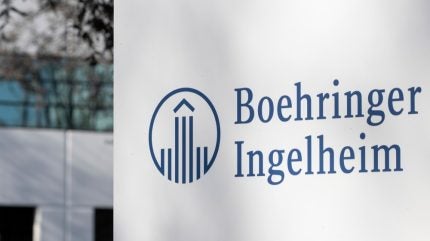
Boehringer Ingelheim is seeking regulatory approval for nerandomilast after a Phase III trial in idiopathic pulmonary fibrosis (IPF) met its primary endpoint.
Boehringer confirmed the Phase III FIBRONEER-IPF trial (NCT05321069) met its primary endpoint of improving the forced vital capacity, a measure of lung function after 52 weeks. The company plans to present full efficacy and safety data from the study in the first half of 2025.

Discover B2B Marketing That Performs
Combine business intelligence and editorial excellence to reach engaged professionals across 36 leading media platforms.
Boehringer was quick to tout that nerandomilast’s Phase III trial was the first IPF late-stage trial in a decade to meet its primary endpoint. This is not the first time Boehringer has found success in the space.
Its tyrosine kinase inhibitor (TKI) Ofev (nintedanib) was approved by the US Food and Drug Administration (FDA) to treat IPF in 2014. It has since been approved in the US for interstitial lung disease associated with systemic sclerosis or scleroderma (SSc-ILD) and chronic interstitial lung disease. Ofev has also raked in record profits for Boehringer, last year the therapy generated €3.5bn ($3.89bn) in global sales.
The Phase III FIBRONEER-IPF trial enrolled 1,177 patients with IPF randomised to receive either nerandomilast or placebo twice daily. The study’s secondary endpoint is time to the first occurrence of acute IPF exacerbation, first hospitalisation for respiratory cause, or death.
Nerandomilast is a preferential inhibitor of phosphodiesterase 4B (PDE4B). It received a breakthrough therapy designation from the US FDA for the treatment of IPF in 2022. Boehringer is also investigating nerandomilast in patients with progressive fibrosing interstitial lung diseases in a Phase III FIBRONEER-ILD trial (NCT05321082), which is due for completion by the end of the year.

US Tariffs are shifting - will you react or anticipate?
Don’t let policy changes catch you off guard. Stay proactive with real-time data and expert analysis.
By GlobalDataIPF has a high unmet need as there are only two US FDA-approved medications, Ofev and Roche’s Esbriet (pirfenidone). Whilst Roche’s TGF-beta synthesis inhibitor also secured FDA approval in 2014, it has seen its profits erode due to the introduction of generics. The drug earned SFr718m ($752m) in sales in 2022, which dropped to CHF202m ($239m) in sales last year, as per Roche’s financials.
The majority of other therapies in development for IPF are in Phase II clinical trials. In May, Vicore Pharma’s Phase IIa trial of angiotensin II type 2 receptor (AT2R) agonist buloxibutid in IPF met both its primary and secondary endpoints. Bridge Biotherapeutics’ Phase II trial evaluating its autotoxin inhibitor, BBT-877 in IPF is expected to report topline data in the first half of 2025.




